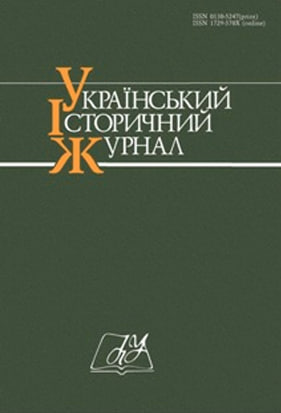Service at Court, “Loyalty to the Monarch” and the Patronage of Royal Dignitaries as Arguments in the Election to the Post of Sotnyk of Zaporozhian Host
DOI:
https://doi.org/10.15407/uhj2020.05.022Keywords:
Hetmanshchyna, Zaporozhian Host, free election, sotnyk, Cossack officers, political cultureAbstract
The purpose of this study is to analyze the nature and scale of the decline of the principles of free election of Cossack officers of Hetmanshchyna, due to the intervention of the Russian authorities in the process of staffing hundreds of governments.
The research methodology is based on comparison strategies and typology.
The scientific novelty is connected with the study of the influence of the imperial center on the nature of the administrative practices of the Ukrainian autonomy 17–18 centuries. Through the establishment of control over the personnel policy of Hetmanshchyna and the deliberate erosion of the principles of free election of Cossack officers. Attention is paid primarily to the efforts of the imperial authorities after the defeat of the anti- Russian speech of Hetman I.Mazepa in 1708–1709 to change the legal field of the electoral process, on the one hand, limiting the will of the Cossack society and the participation of regimental officers, and on the other – putting it under the control of its officials. Examples of direct appointment to the hundreds in Ukraine by decrees of the tsar, the Senate and other governing institutions of the Russian Empire in circumvention of the legal norms and traditions in force in Hetmanshchyna are considered in detail. Procedural features are reconstructed and the motivation of such personnel decisions is clarified. In particular, attention is drawn to the fact that in substantiating such appointments, the token “loyalty to the monarch” clearly dominates the motives of outstanding abilities or merits of the candidates. In addition, it was established that a significant part of the officers appointed in this way came from Balkans and before that was in no way associated with Zaporozhian Host, and proved his loyalty to Peter I during the Prut campaign in 1711. Separately studied the practice of protecting the interests of hundreds government statesmen and military leaders of Russian Empire, influential courtiers and representatives of the ruling Romanov dynasty. In this context, a special official advance for the meeting of the sotnyk in Hetmanshchyna, which was provided by the service at the imperial court, including in the rank of court singers, is highlighted.


